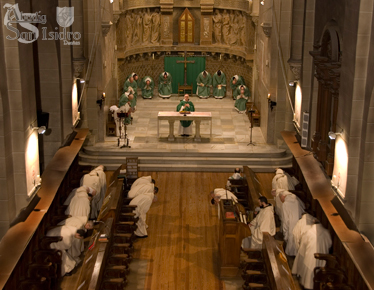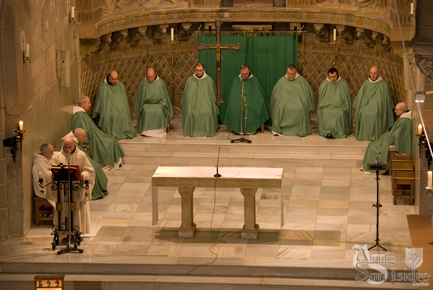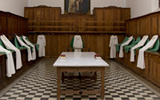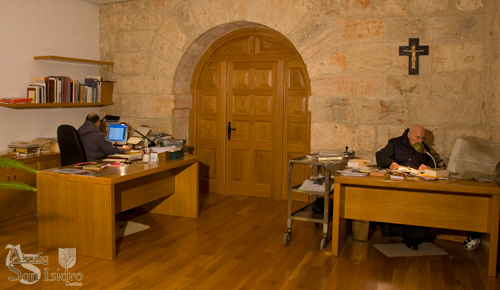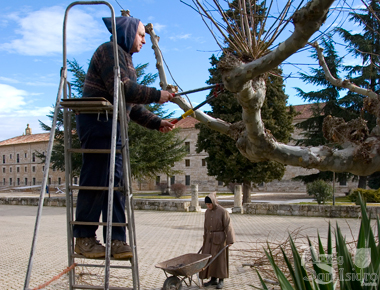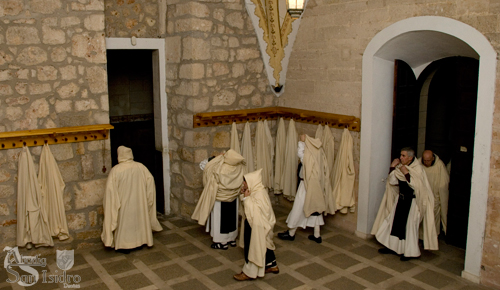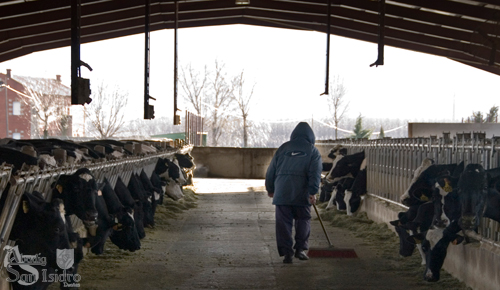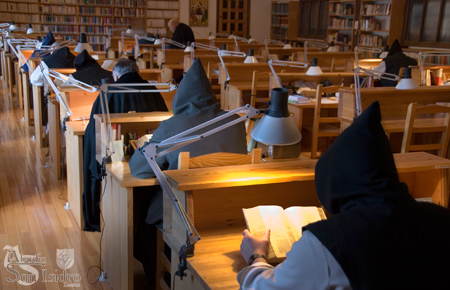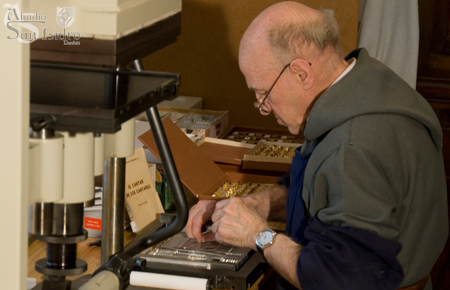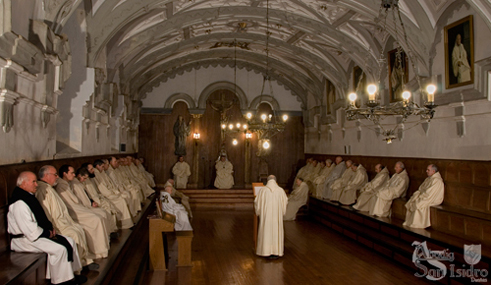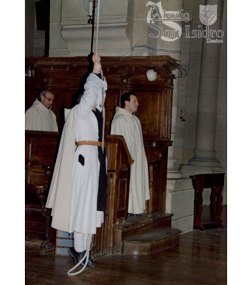A MONASTIC DAY
Introduction.
The Christian and Monastic prayer:
Since man comes entirely from God, he must recognize and confess this power of his Creator, as the godly men did when they prayed at all times. The source of the Christian prayer is Christ Himself, the Lord of all the men and the only intermediary thanks to whom we can have access to God. In this way, He joins all the human community and it is set down an intimate union between the prayer of Christ and the one of the entire human genre. (n.6)
Following the evangelical piece of advice to pray restlessly, the monks have sanctified the day by means of the Liturgy of Hours. Seven times a day they join their voices to sing the praises of Lord, by means of a sing of hymns, psalms and chant taken from the Sacred Scriptures.
The structure of the celebration:
“Not only in the communal celebration but also in the lone recitation, the essential structure of the Liturgy endures which is a conversation between God and the man. However, the communal celebration reveals the ecclesiastical nature of the Liturgy of Hours, it facilitates the active participation of all in accordance with the condition of each individual, with the acclaims, the dialogue, the alternate psalmody and other similar means and it takes better account of different means of expression. For this reason, whenever a communal celebration can be taken with the attendance and active participation of the worshippers, it must be preferred instead of a lone celebration and private somewhat. Besides, it is recommended that the Service is chanted during the celebration in the choir and in public respecting the nature and functions of each part” (n.33)
Vigils
The vigils
The monastic day starts with the liturgical prayer of the Office of the Vigils. The service consists of the chant or recitation of the psalms in which the church, by means of a monk, lifts up its voice to God and the listens to His Word.
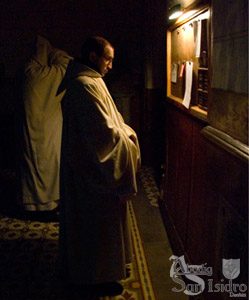
Vigils
In the likeness of the Easter Liturgy, the Fathers of the Church exhort the faithful, especially those that dedicate themselves to the contemplative life. The night prayer which expresses the wait for God who has to come back and secondly intensifies it: “At midnight, a voice was heard: “the spouse arrives, come you out to welcome Him!” (Mt 25,6). “Watch therefore-for you do not know when the master of the house will come, in the evening, or at midnight, or at cockcrow, or in the morning-lest he come suddenly and find you asleep” (Mc 13,35-36).
Saint Benedicte teaches us “who wishes to pray need have not only the circumstances of the place but also in an appropiate time”. The time totally free is the most convenient and suitable, especially when the night imposes a deep silence. Then the prayer is more freely and purer. “Stand up by night, at the changing of the guard, pour out thy heart like water before the face of the Lord” (cf. Lm 2,19). How secretly the prayer rises up by night before the only presence of the Lord and the Angel who gathers it to present it at the Altar of the Heaven! How pleasant and magnificent, blushed in the shyness of modesty! How serene and quiet, not disturbed by the resounding shout!” (Sermon about The Song of Songs, 86,3)
Lectiom Divina
When this office ends up, the monks continue praying by means of the reading of the Word of God.
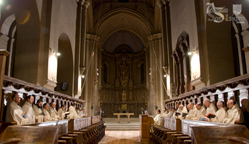
Vigils
The frequent reading of the revealed Scripture is necessary to reach a deeper knowledge of Christ. The Word of God is not conformed with a simple spiritual reading or as an intellectual curiosity. In terms of an educator of the heart, the inspired word claims an entire exercise from man. The Word of God is lively and effective (cf.Hb 4, 12) and, par excellence, an educator of the heart. The Lord provides us with His Word so that we listen to Him when we read and speak to Him when we pray. It is not always easy to enter into that dynamics, a minimal learning and persistence is required in the exercise as a way of overcoming the emerging difficulties. The Fathers of the Church compare the Sacred Scriptures with the “shell”, hard and bitter sometimes, but conspiratorial of the sweetness of the grace that protects from the easy and quick manipulation by man.
Lauds
Lauds
At dawn, the Celebration of the Mass begins, joined to the Office of Lauds, when the community raises their thanks giving to God for the gift of a new day.
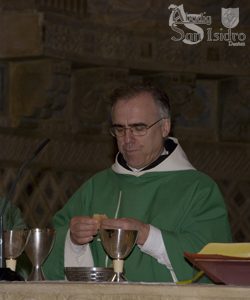
Lauds
The morning lauds are led and arranged to sanctify the morning as it jumps out by many of their elements.
Saint Basil perfectly expresses this morning character with the following words: “when the day starts, let´s pray so that the first impulses in the mind and heart are for God and do not worry about anything before having rejoiced with the thought of God, as it is said: “I beseech Thee, my Lord, in the morning You will listen to my voice, in the morning I will expound You my cause and I will stay awaiting.” (Sal 5, 4-5).
This moment is celebrated at the very start of the day, besides it recalls the memory of the Resurrection of Jesus Lord, which is the true light that illuminates mankind.
As Saint Cyprian teaches us, “in the morning, prayer will be offered to celebrate the Resurrection of the Lord with the Morning Prayer.”
Terce, Sext and Nona
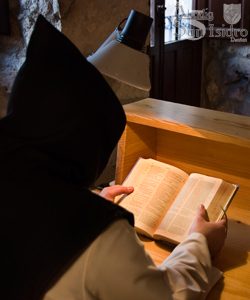
Terce, Sext and Nona
After breakfast time, the praying of the Office of Terce takes place and after an hour of communal reading, the daily work starts, which goes on until some minutes before the Office of Sext that takes place at noon and it is followed by a communal meal and a time of rest. The working day continues with the Office of None, after which the community comes back to work until mid-evening, the moment when the brethren give to the individual prayer and the Lectiom Divina again.
According to the very ancient tradition of the Church, the Christians used to pray for private devotion at specific times of the day, even in the middle of work, in imitation of the Apostolic Church. This tradition led to different liturgical celebrations. Both in the West as in the East, the liturgical custom of praying Terce, Sext and None has persisted, mainly because the memory of the events of the Passion of the Lord and the former got together at the same hours.
Work
The monks are subject to the law of the work – they have to earn their own living to satisfy both their own needs and others. “ But being always sincere in love ”. (Ef. 4, 15).
To love God with all your heart and all your soul, it is also necessary to love Him with all your body. The course of wisdom also goes through the harmony of the body. In this sense, the decoupling between wisdom and work is more evident in our consumer society. People strive and are disquieted in a constant tussle, not so much to settle the most essential needs but to improve the standard of living and guarantee a better system of necessities.
When moderation lacks, work exhausts and stupefies. Hereupon the Cistercian monastery is a testimony for the man today that a wise moderation at work is possible and necessary, able to redeem and not to oppress people
Vespers
The Office of Vespers takes place at sunset, when the monks, getting together in the church, celebrate the liturgical prayer in the evening as a chant of thanks giving to God for a working day passed by.
At the end, the monks, after a period of personal prayer, they go to the refectory for dinner.
The Vespers are held in the evening when the day is far spent, “in a thanks giving act for all that we have been provided with and for all that we have been able to do successfully”. (Saint Basil the Great)
We also think back in the redemption by means of the prayer that we elevate “as incense in the presence of the Lord” and in which “the uplifting or our hands” is “as the evening oblation” (cf. Sal 140,2)… and in order to orient ourselves in the expectation of light that knows no sunset, “we pray and plead so that the light turns back always toward us, we ask for Christ to come and give us the gift of the eternal light”. (Saint Cyprian)
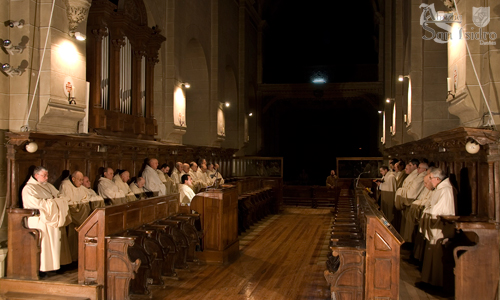
Vespers
Complines
Complines and the chant to the “Cistercian Salve”
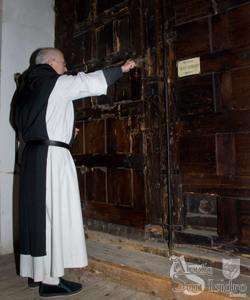
Complines
Before finishing the day, the monks get together in the chapter hall where the Father Abbot explains the Rule of Saint Benedicte and other aspects of the monastic spirituality as an instructional teaching to the monks.
After fifteen minutes, the Office of Complines comes up in order to ask God for His protection during the night´s rest and when on a daily basis, the monks end up their working day with a chant of the well-known “Cistercian Salve” to the Virgin.


